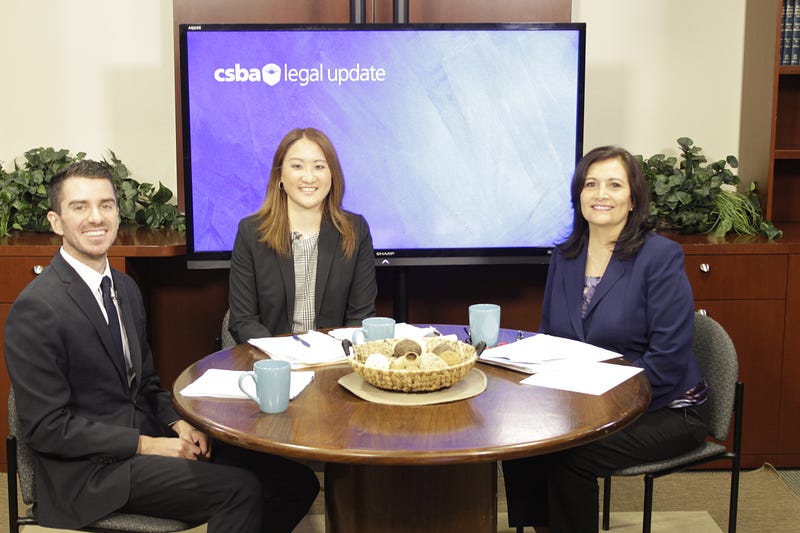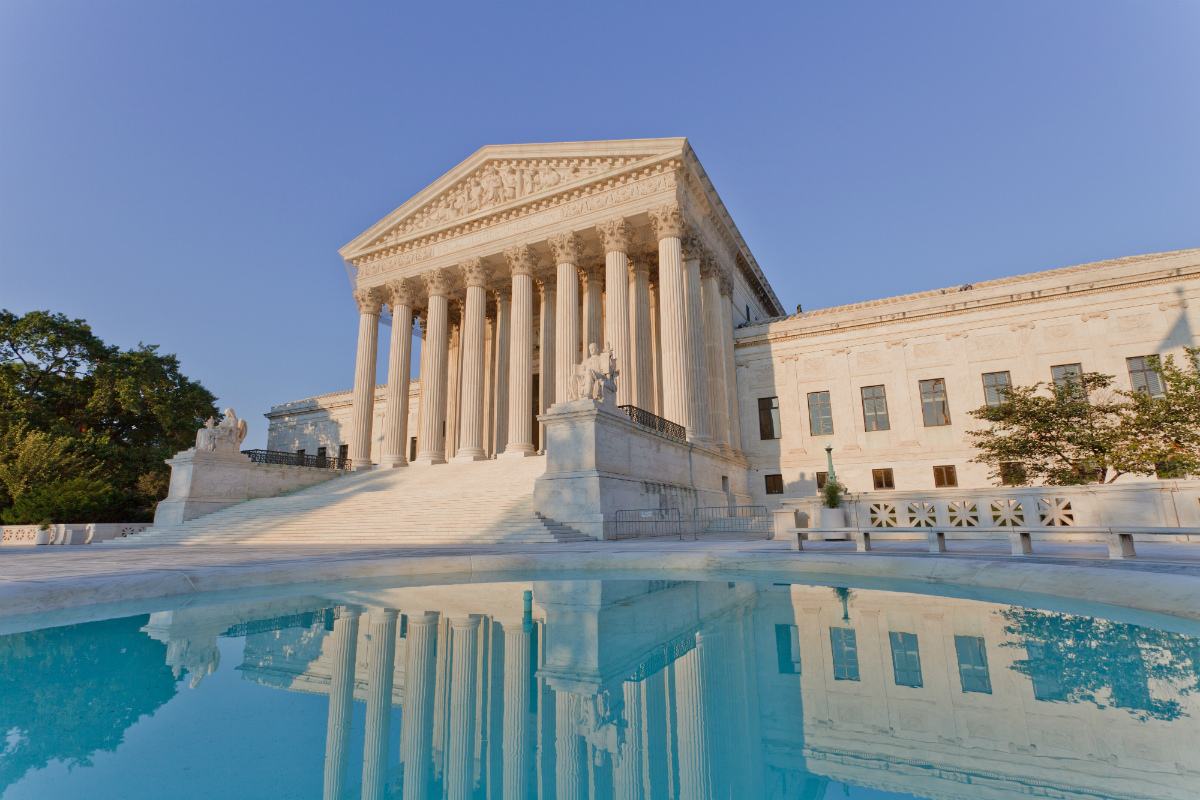by CSBA staff
The U.S. Supreme Court issued its highly anticipated opinion regarding Janus v AFSCME. As expected, the Court has ruled, by a 5–4 margin, that compelling nonconsenting employees to pay agency fees, also known as fair share fees, to unions is a violation of their First Amendment rights. This decision by the Court overturns its 1977 ruling in Abood v. Detroit Board of Education.
Abood, a 1977 Supreme Court case, gave public employees represented by a union the right to opt out of paying full dues, but upheld the legality of requiring them to pay an “agency fee,” sometimes referred to as a “fair share” fee. That fee is an amount calculated to cover the costs of union representation relating to the collective bargaining process, contract administration, and pursuit of matters affecting wages, hours and conditions of employment. It does not include the costs of a union’s political activities.
In California, Abood has been implemented in that manner. California’s Educational Employment Relations Act required payment of agency fees as a condition of employment, but allowed employees to opt out of those fees that would go toward subsidizing a union’s political activities. With Janus, that has changed.

Janus argued, successfully, that bargaining activity is inherently political and, therefore, employees should be able to opt out of paying any fees at all to the union.
In deciding for Janus, the Court wrote that, “States and public-sector unions may no longer extract agency fees from nonconsenting employees. The First Amendment is violated when money is taken from nonconsenting employees for a public-sector union; employees must choose to support the union before anything is taken from them. Accordingly, neither an agency fee nor any other form of payment to a public-sector union may be deducted from an employee, nor may any other attempt be made to collect such a payment, unless the employee affirmatively consents to pay.”
This decision results in an immediate change in the payroll deductions procedures for those employees who have previously foregone membership of the employee organization, but were required to continue to pay agency fees, or to make other payments to the union.
“Our members have been concerned about the implications of a decision in Janus and how it might affect their operations and their relationships with labor unions,” said CSBA CEO and Executive Director Vernon M. Billy.
The decision may also have implications for the implementation of new legislation designed to blunt the impact of Janus. The 2018–19 Budget Package the Governor signed this morning attempts to change labor law with several key provisions that were drafted in anticipation of a decision for the plaintiff. Specifically, the decision calls into question the legality of parts of Senate Bill 866, and possibly the legality of existing authorizations of agency fees or other payments for deductions.
SB 866 contained the following provisions:
Regarding Dues and Revocation:
- Education Codes Sections 45060 and 45168 address the revocation of certificated and classified employee authorizations for payroll deductions.
- For Certificated employees, the law now includes deductions for service, programs, or committee provided or sponsored by employee organizations, in additional to union dues. For Classified, the law currently includes union dues and other service dues.
- Revocations must comply with the terms of the written authorizations
- Governing boards may (no longer shall) deduct actual reasonable costs of making the deduction.
- Employee requests to cancel or change authorizations for payroll deductions for employee organizations shall be directed to the employee organization rather than the governing board, and the employee organization shall process these requests.
- Governing boards shall rely on information provided by the employee organization regarding whether the deductions were properly canceled or changed. The employee organization shall indemnify (legally defend) the public school employer for any claims made by the employee for deductions made in reliance on that information.
- An employee organization that certifies that it has and will maintain individual employee authorizations shall not be required to submit to the governing board a copy of the employees’ written authorization in order for the payroll deductions to be effective, unless a dispute arises. The employee organization shall indemnify (legally defend) the public employer against the legal responsibility of their actions and for any claims made by the employee for deductions made in reliance on its notification.
Prohibited from Deterring or Discouraging Membership
- Government Code 3550 is amended as a declaratory statement of existing law, in addition to adding “applicants” to the section. This section is amended to include that public employers may not deter or discourage applicants, in addition to public employees, from becoming or remaining members of a union, or from authorizing representation by an employee organization, or from authorizing dues or fee deductions to an employee organization.
NOTE: Again based on the Court’s decision, Districts/County Offices of Education must cease deductions from paychecks of employees who are not union members immediately. In effect, while informing employees of such change in dues/fees deductions would be consistent with the Court’s order, it may be inconsistent with the intent of the amended State law — Government Code 3550.
Mass Communications
- Government Code 3553 is a newly added section which addresses “mass communications” by the public employer to public employees or applicants concerning public employees’ rights to join or support an employee organization, or to refrain from joining or supporting an employee organization.
- This law would require the public employer to meet and confer with the employee organization concerning the content of the mass communication.
- If there is no agreement on the content, and the public employer still chooses to disseminate the mass communication, it must also distribute, at the same time, a communication of reasonable length by the employee organization. Adequate copies shall be provided to the public employer by the employee organization.
- “Mass Communication” is defined as a written document, or script for an oral or recorded presentation or message, that is intended for delivery to multiple public employees.
- This section does not apply to the distribution of a communication concerning public employee rights.
Confidentiality of Details Regarding Orientation
- Government Code 3556 is amended to prohibit the disclosure of the date, time and place of the new employee orientation to anyone other than the employees, the exclusive representative, or a vendor that is contracted to provide a service for purpose of the orientation.
- The Legislature finds the employee rights of privacy outweighs the public right to access with respect to the new employee orientation, and as such, imposes this restriction on the public’s right of access.
“Our members have been concerned about the implications of a decision in Janus and how it might affect their operations and their relationships with labor unions,” said CSBA CEO and Executive Director Vernon M. Billy. “If nothing else, today’s announcement lifts the cloud of uncertainty and provides some measure of clarity on how to proceed with matters like fair share fees, payroll deductions and reimbursements. Questions remain, especially related to the implementation of provisions in the 2018–19 budget package that seeks to mitigate the effects of Janus. These new laws alter the way employers conduct orientations, communicate with union members and handle changes to membership status. We will continue to help California’s school districts and county offices of education work through these issues so they can minimize disruption and implement the Court’s decision with fidelity.”
Again, for further analysis of Janus v AFSCME and its implications for LEAs, be sure to watch CSBA’s legal experts discuss the Janus case. You can also find additional information on the history of Janus in this overview of the case, published on June 18.





